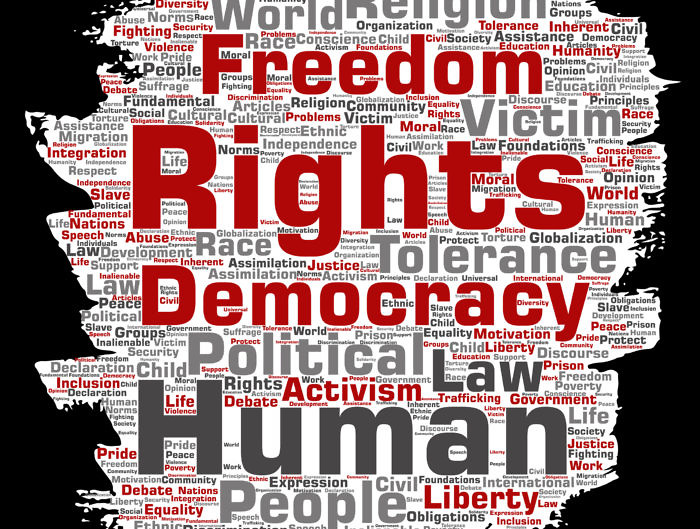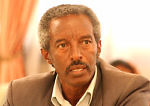In 1990, after the liberation of Massawa and on the eve of Eritrea’s independence, the following individuals met in Nakfa to strategize about post-independent Eritrea’s economic policy:
1. Bitweded Abraha
2. Oqbe Abraha
3. Adhanom Ghebremariam
4. Estifanos Seyoum
5. Estifanos Afewerki (“Bruno”)
6. Ghebremicael Mengistu (Eritrean Relief Association)
7. Berhane Abrehe
I have chosen to begin this article about Berhane Abrehe’s book “Hagerey Ertra” with the above-listed seemingly-random information to tell you exactly where I am coming from. This article is not a book report, it is not a review: it is a perspective about the book. And right up front, I owe the readers disclosure about my bias and my focus: I am only interested in the “How To Rid Eritrea of Isaias Afwerki” manual portion of it.
There are different perspectives. If you are, say, a veteran of the Eritrean Liberation Front (ELF), you may have one perspective. If you are a supporter of the Eritrean People’s Liberation Front (or someone who eventually reconciled with the reality that it is the sole liberation front), you may have another. If you are a PFDJ-supporter, you may have another. If you are a post-PFDJ Eritrean, you may have another. If you don’t care about any of that at all and only consider removal of Isaias Afwerki from power as your sole priority, you will have another. If you are a TPLF-supporter, a Tigrayan Ethiopian or someone who is unwilling to consider the context of explicitly racist expressions, I doubt you will get past page 41: it is just too much to take for you.
So back to the attendants of the 1990 meeting in Nakfa. The individuals mentioned are, at least by Eritrean standards, among our most highly-educated potential technocrats. Let’s consider what has happened to them:
1. Bitweded Abraha: enforced disappearance since 1994 (24 years)
2. General Oqbe Abraha: one of only two four-star generals, enforced disappearance since 2001 and presumed dead in prison
3. Adhanom Ghebremariam: along with Ogbe Abraha, one of the G-15: exiled since 2001;
4. Estifanos Seyoum: along with Oqbe and Adhanom, one of the G-15; disappeared since 2001;
5. Estifanos Afewerki (“Bruno”): Eritrea’s ambassador to Japan. Formerly frozen, now essentially in exile (you can’t get further from Eritrea than Japan), trying to claw back to relevance by pledging daily allegiance to Isaias Afwerki and insulting his former comrades (in this case, former EPLF leader Ahmed Al-Keisi), in Twitter;
#Eritrea #Ethiopia have their share of political parasites of the like of Ahmed Al-Keeisi who thrived on blood, sweat & tears of our people
— Ambassador Estifanos (@AmbassadorEstif) November 6, 2018
6. Ghebremichael Mengisu: former ambassador to Belgium, considered by many to be one of Eritrea’s brightest: frozen.
7. Berhane Abrehe: author of the book we are discussing, former Minister of Finance, abducted just months ago.
Here’s another context: he started writing the book in November 2012 and finalized it in January 2013. The author took it for publication and told the publisher in Asmara the write-up includes “a call for a change in the head of the government” which made it untouchable. While he was mulling on what to do next, the Lampedusa tragedy hit on October 3: over 360 Eritreans died when their boat capsized a kilometer from the port and (a) the Eritrean government referred to them as illegal migrants of African origin; (b) blamed the United States for their death; (c) made no effort to intern their bodies to Eritrea despite its promise to do so. This tragedy, which awakened even many of the permanently comatose, appears to have been a great push for the publication of the book, specially considering that the author, as member of Cabinet of Ministers, had proposed (and been rudely rejected by Isaias Afwerki) that the government convene a special meeting just to deal with the exodus of Eritreans.
Another context: in 2013, the Eritrea-Ethiopia border issue had been held hostage by Ethiopia (read: EPRDF. Re-read: TPLF) for nine years. Eritrea had been sanctioned for 4 years.
Now, to the ugly part. Where you and I might define Government of Ethiopia 2013 as TPLF-dominated EPRDF, Berhane Abrehe goes further: Tigrayans. Having concluded that Tigrayans collectively are responsible for Eritreans’ misery, he goes back to history and assigns guilt to all of them not just for the 2010s, but also the 2000s, the 1990s, 80s, 70s, 60s, 50s, 40s… In several places in the book, he says “Tigrayans” (not Tigray elite or politicians, but Tigrayans), defining them as inherently wicked and untrustworthy whose evil is hard to forgive. Sometimes, he resorts to PFDJ-era definition of TPLF as dominated by Adwa, Shre, Aksum, Agame (A.Sh.A.A.) and condemns people from those areas (listing the worst of the worst of TPLF: Abbay Tsehye, Siye Abraha, Gebru Asra)but then just as quickly he goes back to blanket accusation of the whole region. He even mocks their dialect.
One is mystified by this since he is a veteran of the EPLF and the organization went to great extent to present itself as a progressive organization, a Marxist one which had solidarity with all poor and oppressed people and you can’t get poorer and more oppressed than Tigrayans. The quickest explanation is that the book suffers from being self-edited: to paraphrase an expression used for lawyers, a writer who edits his own book has a fool for an editor. But just when you think that, Berhane Abrehe appears to have already predicted we would say that and classifies those of us who oppose this type of blanket condemnation into four categories: (1) Ethio-Eritreans; (2) those whose interests are tied with Ethiopia; (3) Ethiopian secret agents; (4) educated Diaspora-dwellers who take pride in their rational and unemotional worldview. He doesn’t mean the last one as a compliment.
So, I think he is an Eritrean Trump: a nationalist. Someone who thinks political correctness has clouded our reasoning. And in an amazing coincidence, his book was published just around the time Isaias Afwerki was giving all the hyper-nationalists, birthers and nativists every reason to have their views legitimized. And if you don’t like that, well, he was willing to go to prison for his beliefs: what did you do for yours? So, let’s at least respect that part of him even if we disagree with his archaic worldview.
Isaias Afwerki features very prominently in Berhane Abrehe’s book. Remember the four categories of Eritreans who oppose blanket condemnation of Tigrayans? Isaias Afwerki fits three: an Ethio-Eritrean whose interests are tied with Ethiopia who happens to be a secret agent. Some of the adjectives used to describe Isaias include ምሒር ህልከኛ (belligerent); ከዳዕ (traitor); ሰርሳሪ (unscrupulous); ሓውሲ ኢትዮፕያዊ (semi Ethiopian); ሰላዪ (spy); ዘራጊቶ (tornado.)
Now, remember how I said, “if you have ELF background, you will have one perspective”? Well, to an ELF-veteran these adjectives are all in the “tell me something I don’t know” category. Per ELF, Isaias Afwerki was a spy recruited by Ethiopia, who was working closely with Asrate Kassa and his deputy Tesfahannes Berhe, with a single mission: to work from within to frustrate the Eritrean armed struggle. This was later corroborated in a book where the author, previous administrator of Dekemhare, said that he facilitated meetings between Isaias Afwerki (then based in nearby Ala) and Asrate Kassa at American military station “Kagnew” in Asmara. The author surrendered to Ethiopia and, in post-Mengistu Ethiopia (the EPLF-TPLF honeymoon), he was assassinated in Addis Abeba.
So, an ELF-er would say, “what took you so long? And do you think you contributed in empowering this Zeragito/spy/traitor?”
Berhane doesn’t directly answer that. In his worldview: the Eritrean People’s Liberation Front (EPLF) was a politico-military organization which had a culture of order-givers, orders-takers. Thus, it cannot be faulted for not nurturing democratic ideals or inquisitive minds. Most hyper-nationalists are suspicious of the educated class, but not Berhane Abrehe. Himself part of Eritrea’s educated elite (graduate of University of Illinois at Urbana-Champaign) he says the Eritrean revolution owes a huge debt of gratitude to its intellectuals who were critical in transforming the people into politically-conscious unrelenting fighters for a cause.
Moreover, according to Berhane Abrehe, Isaias Afwerki did not assume power until 1987. From 1970 to 1987, it was Ramadan Mohammed Nur who was the Secretary General of EPLF. Isaias was the number 2. Then, just before the 1987 congress, it was some members of the EPLF politburo (whom he won’t mention because they are exiled and/or in prison) who organized a coup and all Ramadan said, in the interest of protecting the Front, was “you are making a mistake.” The 1987 EPLF congress also eliminated the deputy Secretary General post, beginning the consolidation of power in Isaias Afwerki.
Berhane sees both as mistakes. But, in his mind, it was an election for a 5 year-term and Isaias was going to be removed from power in 1992 anyway. But then, there was that preparation for referendum and his term was extended for another 5 years (1997), and then, Isaias triggered the war to avoid an election (1997-2002), and then the “thorns” (Ethiopians) and imperialists (Americans) colluded to delay implementation of the border ruling as well as imposing sanctions to render null-and-void the 2002-2007, 2007-2012, and 2012-2017 elections. It is not just the fault of the Ethiopians and the Americans, he says: those who were sworn to protect the constitution and the country, the military leaders, got corrupted–government provided cars and housing, government provided groceries, opportunities to be entrepreneurs benefiting of the unpaid labor. They were part of the coup d’etat that was performed in 2003 to entrench Isaias Afwerki. (He doesn’t spare his colleagues and their role in creating a monster.) In essence, Isaias Afwerki is an illegitimate president who is governing without a mandate for the past 21 years.
Since his unilateral dissolution of the constitution and unilateral dismissal of the Eritrean Assembly is arbitrary, capricious and illegal the way forward is the law. Change must be done peacefully with no or minimal clash. And how does that work?
Step 1: A 7-9 member Political Power Transfer Coordinating Committee is instituted. This body (whose Tigrinya initials are ኮኣምፖስ) has the sole task of being a facilitation body. Reflecting Eritrea’s diversity, it is made up of civilians and military who know the country’s make up, security, economy, society, law, national defense. “For obvious reasons”, he says, “it will be constituted secretly.”
Step 2: The 150-member Eritrean National Assembly which was made up of 75 PFDJ Central Committee and 75 public-elected members and which hasn’t met since 2002 convenes in Asmara. Those who are alive including those in prison (for details see below) should all convene in Asmara. With its chairman under arrest (see below) and since it doesn’t have a speaker or a vice chair, there will be a problem having a chair. Berhane Abrehe recommends either Ramadan Mohammed Nur (for being a founding father) or Ahmed Baduri (for having intricate knowledge of how legislative bodies work) as chairs. This will be a transitional National Assembly until a permanent one is elected.
ኮኣምፖስ will give specific directives to different entities.
1. To Isaias Afwerki: Time is up. In the interest of national salvation and your personal security, you are going to be arrested and detained at Adi Halo immediately after your receipt of this notice. You are prevented from meeting with government officials, the military and your family as you await for decisions of the National Assembly.
2. To Cabinet of Ministers and Zonal Administrators: You know you are not capable for the job and you have not been advancing the people’s interest. Gather up all your employees and notify them that ኮኣምፖስ is in charge and elect your own transitional ኮኣምፖስ
3. To Leadership of PFDJ (Political, Economic, Culture, Organizational, Chairman): for your own safety, do not leave the country. The economic and cultural arms may resume their work but the political, organizational and chairman’s office are frozen. For the sake of national security and your own safety, please note that you are under surveillance.
4. To National Defense Forces: Most of you generals are semi-frozen, anyway, and your absence won’t be noted: so just step aside. The commanders of the four commands, Airforce and Navy should appoint a committee chaired by Sebhat Ephrem and carry out their duties in protecting Eritrea’s sovereignty and refrain from intruding into civil affairs.
5. To the judiciary: Until the National Parliament issues new directives, continue to limp along. Release all those who have imprisoned without charges unconditionally. The sentences of the “Special Court” overseen by “Sheqa Isaias” are henceforth invalid.
6. To National Security Office: Immediately imprison Isaias Afwerki. All you department heads of the National Security office are also detained by your boss. All those who conduct legally-sanctioned functions should resume their work without violating the rights of a single individual. For his own security, immediately detain General Philipos Woldeyohannes. Moreover, for their own security, place under surveillance all government “journalists.”
7. To National Assembly Members: wherever you may be, including prison, return to Asmara immediately. Elect a chairman and lead. Please note all of you elderly are going to be replaced by the youth. Take immediate decision to release all political prisoners and to repatriate all exiled politicians.
8. To Eritrean Youth: Do not say, “I have no experience; I doubt I have the experience”: you will learn when you jump in: the mission will guide you. Build a just, peaceful, democratic prosperous Eritrea.
9. To Ministry of Information: Disseminate all information that is given to you by ኮኣምፖስ in all Eritrean languages.
10. To Religious Leaders: Relying on our rich history of tolerance, shepherd our people. Remember, we do not have a religious government. The government will not involve itself in your internal affairs.
Step 3: A New National Assembly, dominated by the youth, is constituted and the transitional national assembly is dissolved within 3-6 months. Members of the new national assembly are elected locally at their jurisdiction (regions and provinces). These elections (at least the first one) will not be based on political parties but individual elections (unaffiliated.) Berhane also envisions a country which has a president and a prime minister, but this would be subject to popular referendum.
Well, ok. So, why am I willing to overlook some of the hyper-nationalism and outright bigotry? Just because a doctor is eccentric doesn’t mean you don’t accept her diagnosis. Also, because this aligns perfectly with the solution I have been proposing: democratic coup. Except that Berhane’s is a lot more detailed. It is really the most practical way to deliver change in Eritrea. There are two arguments one can make when demanding change: the government of Isaias Afwerki is immoral or the government of Isaias Afwerki is illegal. As we have seen over and over, the first argument has no teeth: which government is not guilty of immorality? And is that cause for changing it? But the second one does: Eritrea has a ratified constitution and a National Assembly that one man, alone, has rendered useless. Therefore, he is breaking the law. He conducted a coup d’etat. Thus, we would be basing the law to reverse lawlessness and demand his removal.
The book has an entire chapter entitled corruption for those ገርሂ ልባ (innocents) who believe Isaias Afwerki is un-corrupt. This is because they have childish ( ቆልዓዊ, as Berhane calls it) understanding of what “corruption” entails. To them, if you don’t have villas in Europe and are not sending your children to elite universities in Europe or America, and your lifestyle is not defined by conspicuous consumption, why then you are clean and not corrupt. This view, propagated by NGOs and think tanks who are turned off by African leaders visible misbehavior, is partly to blame for the perception of Isaias Afwerki and his enables of being “un-corrupt.” But the worst kind of corruption is abuse of power and, in great detail, Berhane Abrehe shows how Isaias Afwerki corrupted the Ministry of Information, Construction Works, Trade & Industry, Social Services, Regional Administration (Zobatat), Finance (Monetary & Fiscal), Office of the President, and even the National Union of Eritrean Youth, National Union of Eritrean Women, National Union of Eritrean Workers (now renamed.) He is entirely unforgiving of those who participated in the corruption. Not surprisingly, he has one blind spot: himself.
In every single case, when one looks at the “before” and “after” of every institution, Isaias was empowered and the institution was destroyed. If nothing else, Berhane Abrehe has filled out some of the gaps in our information (I wished he said more on what happened to the Nevsun revenues) and helps us connect the dots on the Eritrea he saw just before his arrest: the same Eritrea that Isaias Afwerki called “hopeless” before he discovered the magic of Ethiopia months ago.
In the end, all the things people find controversial in the book–is Isaias a spy? Is he Ethiopian? Were the sanctions an American conspiracy, is Ethiopia an eternal enemy, why did we give our embassy in the US to Ethiopia–are secondary to: is Isaias a legitimate president, elected by the people? No. Is he a good president and is Eritrea better off than when he assumed power? No. Can he be removed from power with minimal or no bloodshed? Yes. How? Here is how: it is time for Isaias Afwerki to go and it is time for a group of Eritreans, who are duty-bound by the constitution–the Eritrean National Assembly–to assume their rightful role and take back power snatched by a usurper and pass judgement on the tornado and his enablers.
Of all the proposals out there to rid Eritrea of Isaias Afwerki before he does even more damage to the country, what I call “democratic coup” and what Berhane Abrehe rightfully calls restoration of law and countering an Isaias stealth coup conducted in 2003, is the least disruptive and violent. Sure it doesn’t solve all of Eritrea’s problems and it asks the people to have faith in people who are products of the EPLF and PFDJ, but it is better idea than anything else out there.
Finally, because I was an early exponent of the book, I think I have an obligation to say this: yes, I ordered my book online, yes, I received it on time, and no, I have no prior connection or relationship with Berhane Abrehe and, no, I don’t know why some of you have not received your copy. Giving people the benefit of the doubt, I presume it is because it is a self-published book without a huge distribution network and those who were distributing it were rudely interrupted by zeragito by presenting them with a new priority: dealing with the tragedy of the arrest of a beloved family member: the author.
Postscript: On August 20, 2024, Berhane Abrehe died in prison in Eritrea. The two gentlemen whom he envisioned as co-chairs of a transitional system to restore rule of law, Ramadan M/Nur and Ahmed Baduri, died in 2021 and 2024 respectively.





Leave A Reply